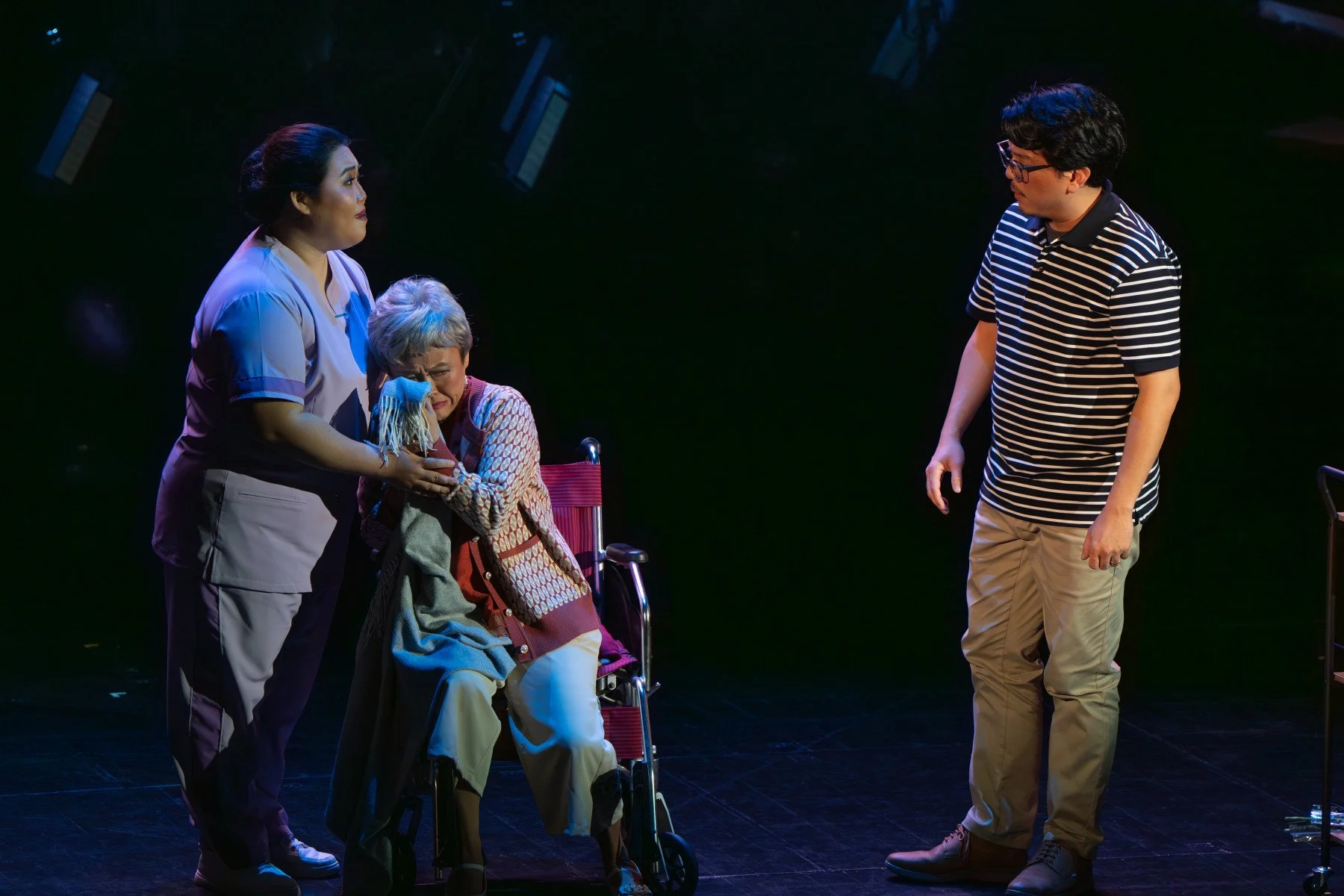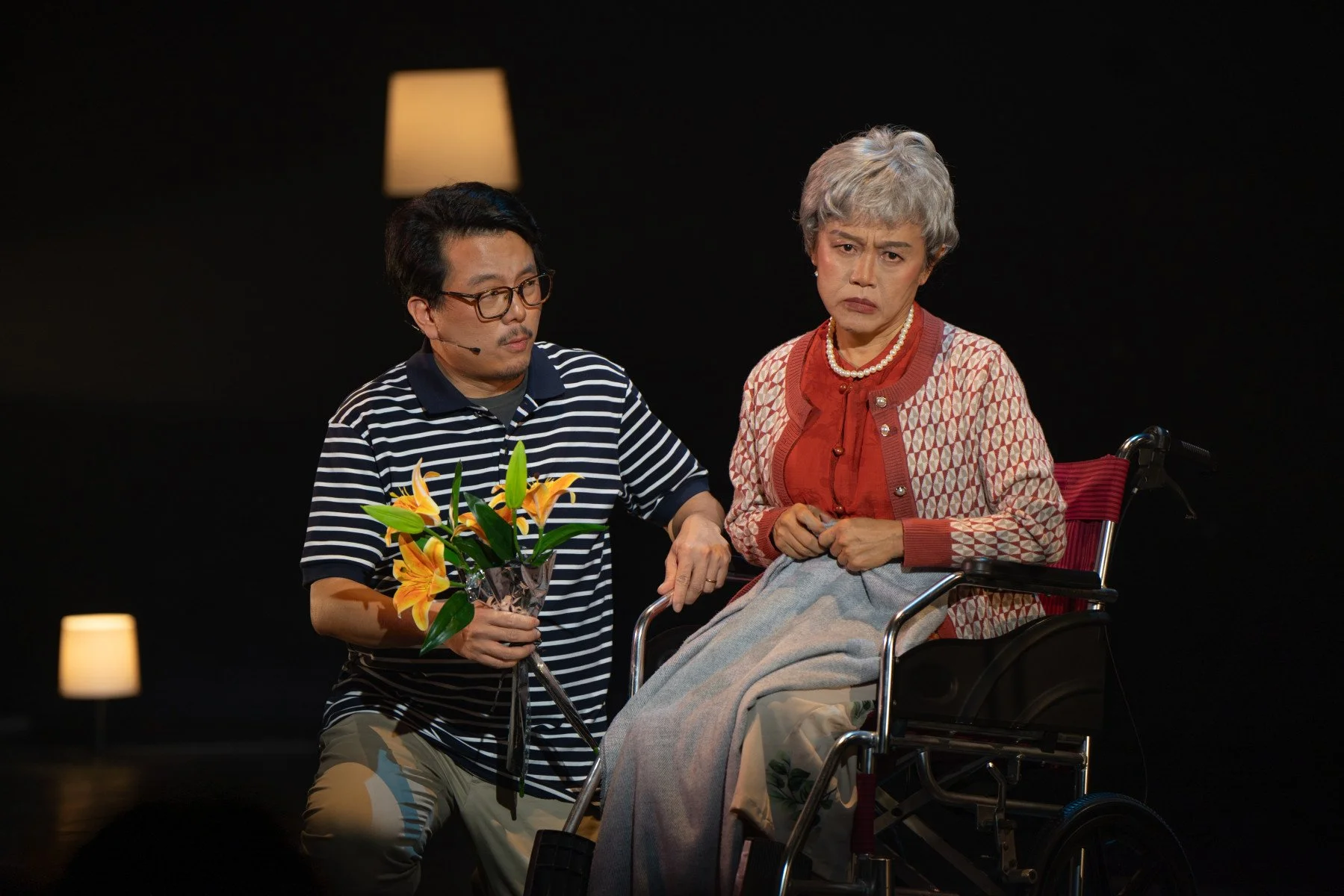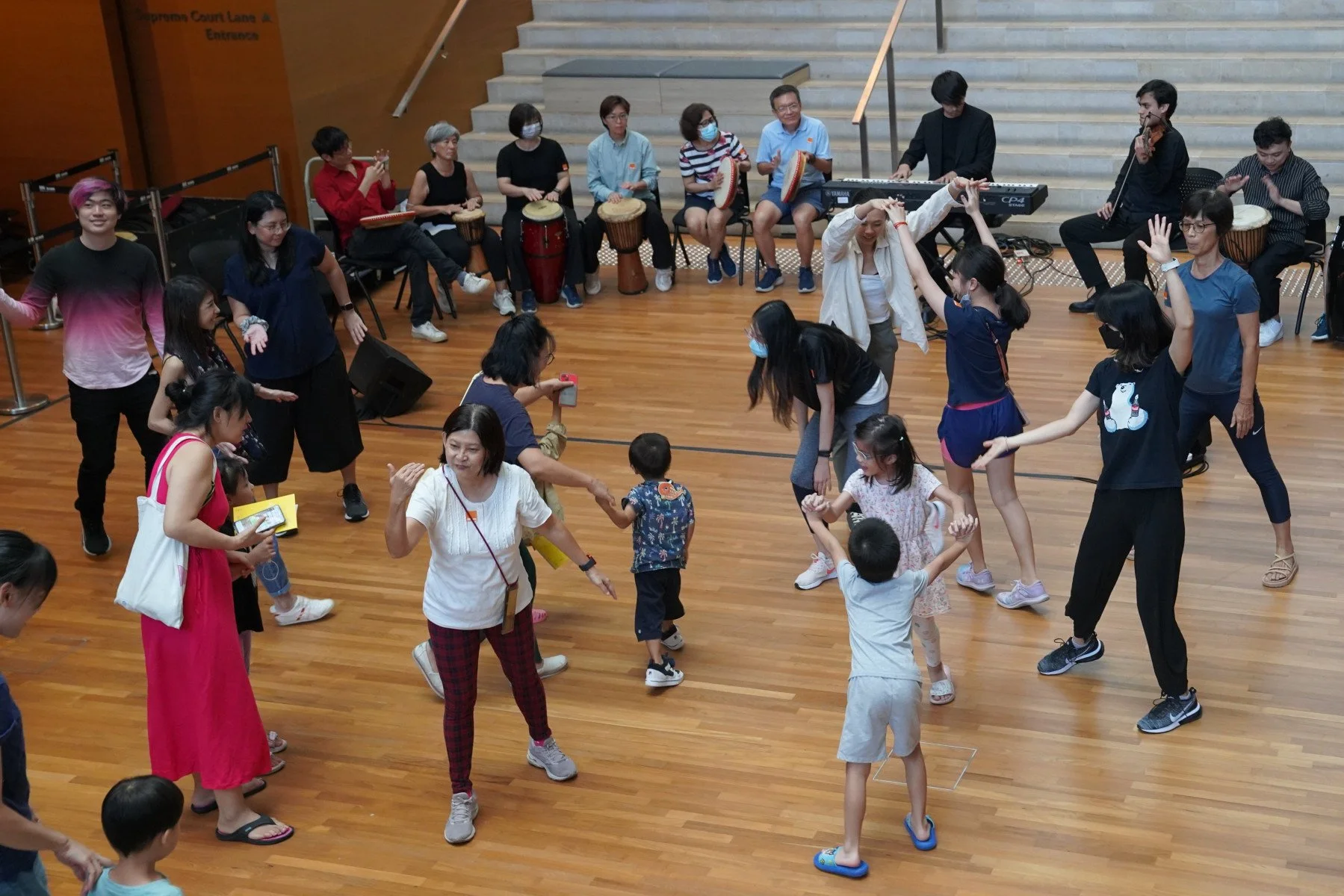Tuning in to the healing power of music
Losing Lily is an opera that illustrates the impact of dementia on patients, their families, and their caregivers, while offering hope in the form of music as a way to connect with such patients. Photo credit: Jellal Koay
An elderly woman sits in her wheelchair, eagerly awaiting her son’s weekly visit. But the man who walks through the door with a bouquet of flowers is a stranger to her, and instead of welcoming him, she cries out for her caregiver to send him away.
After the man tries and fails to convince her that he is indeed her son, the caregiver suggests playing some music to awaken his mother’s memories and bring her mind back to reality, knowing that she used to be a passionate opera singer. Upon hearing a familiar tune, the old woman’s fear melts away and she shares a brief, precious moment of singing and playing music with her son like they used to. All too soon, the moment passes and she retreats into her own world again, but her son is filled with gratitude for the experience, as fleeting as it was.
This is a scene from the opera Losing Lily, which had its world premiere on 15 and 16 October 2024, the culmination of a four-year long project about dementia and music, titled LILY, that comprises Losing Lily and a documentary called A Day A Lily. The project is based on the personal experiences of initiator and co-creator Dr Wong Su Sun and scientific research into the link between music and memory.
While the scene is fictional, the experience of being repeatedly forgotten by someone who should know them well will be familiar to many Singaporeans who have a loved one with dementia. What is perhaps less common is the knowledge that music has a remarkable power to unlock memories and bring moments of joy to people with dementia.
The project aims to raise social awareness of dementia and the use of music to help patients cope with the disease. Research into music interventions for health and well-being is a growing field that is studied in NUS at the Centre for Music and Health (CMH) in the Yong Siew Toh Conservatory of Music (YST).
Raising awareness through opera
Dementia has been poorly understood for many years, but with Singapore’s rapidly ageing population, it is becoming a social issue that cannot be ignored. About 1 in 11 people aged 60 and above in Singapore today have dementia, and the total number of people with dementia is projected to reach 152,000 in 2030.
The LILY project uses opera and documentary film to bring emotion into what could otherwise be a dull discussion of the medical condition while highlighting the evidence-backed use of music interventions.
Dr Wong Su Sun drew on her personal experience with dementia patients in her family, especially her mother, to play the main character Lily. Photo credit: Jellal Koay
Dr Wong, an opera singer and vocal pedagogue, initiated the project in 2020 to give a voice to those who are suffering silently, drawing from her personal experience of having served as caregiver to her parents and grandmother through illness.
“Each of the three characters in the opera, to a certain extent, is a reflection of my own life as a singer and teacher, daughter, and caregiver,” she shared. “I find it particularly healing that each character has moments of soliloquy where their innermost thoughts are expressed and heard by the audience.”
The collaborative project was an extensive process involving composing and scriptwriting, consulting researchers and examining existing portrayals of dementia, and engaging with YST staff and student musicians to bring the opera to life. The documentary A Day A Lily was first publicly screened in 2022 at the National Museum of Singapore, and the opera Losing Lily took another two years to create and stage, with the premiere taking place at the NUS University Cultural Centre.
At the premiere, the audience first watched the documentary, which interlaces an early version of the narrative with interviews of people living with dementia, their family members, and medical professionals. Then, the opera was performed live, illustrating what it is like to live with dementia through the characters of an opera singer, her son, and her caregiver.
Said Associate Professor Chen Zhangyi, who composed the opera with playwright Jean Tay: “Everything comes together in this work as a multidisciplinary art form, a perfect example of the interdisciplinary connections that we are trying to achieve in NUS.”
The healing power of music
Last year, the National Gallery Singapore commissioned the Movin’ and Groovin’ for Wellness programme to host a session for the Gallery Wellness Festival 2023. The programme is studying the impact of certain group activities including drumming and dancing to promote well-being.
The scene of Lily and her son connecting through a song is an example of how music can facilitate memory recall or reminiscences, which can improve patients’ moods and reconnect them with their loved ones.
Said Assistant Professor Kat Agres, founder and director of the Centre for Music and Health (CMH): “It is widely recognised that music has this amazing power to help unlock memories in dementia patients. It's not pure magic and it doesn't work in every case, but it can be very effective and be a wonderful way to help connect the patient with their past.”
At CMH, multiple studies are ongoing to explore the possibilities of using music as a non-invasive, non-pharmacological, and accessible treatment method for a variety of health issues in three main areas of mental health, youth and student well-being, and healthy ageing and community wellness.
One programme, Movin’ and Groovin’ for Wellness, is studying the impact of group activities – specifically dancing, drumming, and improvisation – on supporting mental health, facilitating social connections, and fostering creative expression. A 10-week randomised controlled trial with NUS students found positive results in all three aspects, supporting the use of such activities to promote youth and student well-being.
Group drumming is one of the activities being studied by the Centre for Music and Health for its potential to support mental health, facilitate social connections, and foster creative expression.
Other ongoing projects under the pillar for healthy ageing and community wellness include Sing Out Loud, a collaboration with the Esplanade to explore the effectiveness of regular group singing on decreasing behavioural agitation and improving quality of life for patients with dementia.
Even as research uncovers new insights into the power of music as a health intervention, artworks like LILY are equally important in disseminating knowledge about important health topics, Dr Agres said.
“It's one thing to say, ‘As dementia progresses in the patient, there will be an increase in behavioural symptoms and agitation.’ It's another thing to see it unfolding in front of your eyes – to witness how complex it is, and how difficult it may feel for the family and the patient.”
While there are no immediate plans for more presentations of LILY, the team has already received expressions of interest to collaborate on staging the opera for more audiences in Singapore and overseas, and they are open to discussing ways to extend the project’s impact.
Dr Wong hopes that the opera will become a platform to foster greater understanding and support for people living with dementia – for example, smaller-scale stagings or community performance workshops could encourage people to put themselves in the characters’ shoes and experience the patience and communication skills needed when interacting with people who have dementia. She also hopes to add a chorus to the opera representing the roles of bystanders in society, to show how the public can move from empathising with patients and their loved ones to actively contributing to an inclusive ecosystem.
“This opera shows you what’s ahead, how you could end up, and how you would expect people to treat you when you are in the shoes of any of the characters,” she said. “It is a call for not only empathy, but also greater understanding and engagement from the community.”




